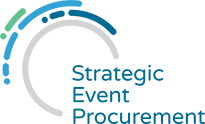Three Considerations for Global Strategic Meetings Management

By now, the benefits of Strategic Meetings Management are well known: reduced risk, cost savings, rich data and reporting and visibility into total spend. Most programs are started in the US, then expand globally as the program matures and adoption grows.
There are two ways to consider a program global. One is where the program is centralized at Corporate HQ, and provides sourcing for domestic and international meetings. In this case, contracts and payments are typically issued from Corporate regardless of destination. Most management and oversight are done centrally, even if local suppliers and resources are used where the event occurs.
Another is where the program offers services on a regional basis, under a framework established by Corporate. Here, sourcing, contracting and payments are done in the country where the event will operate. This model works well for large organizations who have enough volume to support regional teams. Stakeholders like it because they can work with a local team without time zone limitations.
Regardless if a global program is central or regional, there are three things to consider which can impact how the program will run:
- Taxes (VAT)
- Contracting
- Payments
Taxes (VAT)
“Nothing is certain except for Death and Taxes.” Events certainly are subject to their fair share of taxes. In the US, the most common taxes affecting events are sales/use taxes, and tourism/travel taxes. In most cases, there is no legal way to avoid or recover tax payments.
Outside the US, it’s a different story. This is where we enter the realm of Value Added Tax (VAT) also referred to as GST/HST in Canada. To keep things simple, I’ll refer to all as VAT. The minimum standard VAT rate in the EU is 15%. In Singapore, it is 7%, and Japan 10%. These are not small numbers!
What’s interesting about VAT is that it can sometimes be reclaimed. The circumstances under which tax payments may be eligible for a refund vary country-by country. The entity making the payment and how it is made can impact this, so it is important to be informed.
Avalara has some good information on VAT: https://www.avalara.com/vatlive/en/index.html
A search on “VAT Reclaim” will yield other resources, including agencies who can help manage the reclaim process.
Check with your Tax team for more guidance on how to plan for taxes related to your events. You’ll be glad you did.
Contracting
Let me start by saying I am not a lawyer, and none of what follows should be taken as legal advice. I do, however, have extensive experience working with contracts. I learned a few things along the way that I will share.
Something I learned when expanding Microsoft’s SMMP was that signature requirements vary by country. Some countries (Germany and Ireland come to mind) require that companies identify and publish authorized signatories for specific types of contracts. Generally, ONLY the individuals listed may sign contracts.
This matters if your program is working under the regional model described earlier. If contracts will be written between a subsidiary and the local venue or provider, you need to know who can sign. You also need a plan for making sure those people sign in a timely manner, so your contracts don’t get held up. It might be worth looking into designating your sourcing provider as Agency of Record so they can sign on your behalf.
So, you may ask, if this is so complicated, why not have Corporate sign all contracts? Well, the answer stems in part from VAT. The way services are contracted and paid can impact the process for VAT reclamation, which affects your event budget.
There are other considerations that may make it beneficial to sign contracts locally, so be sure to speak with your legal team.
Payments
The final consideration for a Global SMMP is payments. Event payments are a challenge no matter what, and banking regulations, currency exchange and VAT make it more complex for Global programs. Payment methods include Accounts Payable, Credit Card, Agency pass-through or a payment service such as EVED.
Accounts Payable
Accounts Payable is the most common form of payment, and nearly every company has an AP function in place. Here are some pros and cons:
Pros:
- Readily available
- Captures VAT data and sales tax data
- Strong internal controls for duplicate payments, conflict of interest, entities on a “Do not Pay” register, etc.
- Payment in local currency
Cons:
- Time consuming supplier setups
- One-off payments are’t well supported due to the setup time required
- Payment terms are hard to manage
- Infrequent payees are deleted after inactivity and need to be re-established if they are used again
- The process is rigid
Credit Cards
Meeting Cards, also referred to as a P-Card are a popular form of payment for events. With these programs, cards can be restricted to certain merchant types and exclude purchases like fuel, airfare, rental cars and other expenses that should go through T&E. Cards can also be pre-set with limits on total spend and individual transactions. Here are some pros and cons:
Pros:
- Nimble payments
- supports retail transactions
- Plastic can be issued in a matter of days, and v-cards can be done in as little as a few hours
- Incentives are offered for high volume spend
Cons:
- Risk for fraud
- Spend approval is after the fact
- Currency fluctuations can impact budget
- Not universally accepted
- Manual VAT reporting
- Bank regulations affect how programs are setup
Fraud is the biggest risk with card payments. It’s easy to put personal items in the cart on a run to Staples or book a hotel site visit that is really a personal trip. Strict controls need to be in place to prevent and detect inappropriate use. Nevertheless, Meeting Cards can be a key part of your event payment strategy.
Agency pass-through
Some companies use their lead Event Agency(ies) to make payments on their behalf, also known as a ‘Pass-through.’ The idea with this approach is to outsource the entire planning process to the event agency, including contracting and paying suppliers. Like the methods already discussed, this also has pros and cons:
Pros:
- The client makes payments to a single supplier
- Agency is responsible for VAT reclamation and tax reporting
- Everything is ‘under one roof’ for managing the budget
- Payment is more efficient since the agency uses the same suppliers for multiple clients
Cons:
- Limited visibility to spend with downstream suppliers
- Possible loss of leverage if more than one agency is used for the portfolio
- Loss of control over payment terms
- Fees can be 10% or more of total spend
- Risk for fraud
Fraud is a risk since agencies might be reluctant to tell an important client ‘no’ when an inappropriate request is made.
If you have multiple agencies, it will be hard to see how much you’ve paid a particular supplier, because it is split across more than one set of books.
Third Party Payment Solutions (3PP)
3PP providers act as an outsourced AP department. There are several companies that offer this service, although EVED.com is the only one I’m aware whose service offering is designed to meet the needs of #events. Clients pay a license fee and implement the spend management platform. Suppliers join the EVED marketplace and are available to all EVED Clients. They pay a processing fee when they receive payment. The process is streamlined greatly since clients pay one supplier (EVED) and suppliers receive payment from a single source for multiple clients. This approach also has a few pros and cons:
Pros:
- Global payment network for events
- Supports local currency
- End-to-end visibility
- Robust supplier verification
- Payments are efficient
- Robust reporting
- Captures VAT data
- Consolidated budgeting for expenses
Cons:
- Requires implementation and administration
- Needs substantial payment volume to be cost-effective
- Budget functionality doesn’t support revenue (ticket sales, sponsorships, internal funding)
- Does not support retail transactions
As you can see, no single approach to making payments is perfect, and many companies use a combination of methods to meet their needs.
Sometimes, contract language will dictate payment method, and may impact VAT reclamation. Talk with your Finance and Legal teams to make sure all possibilities have been considered.
Conclusion
Expanding your SMMP globally is an effective way to manage your complete meeting and event portfolio. While there are some additional considerations, if you spend a little time up front with Tax, Finance and Legal, you’ll be well on your way to success!
READY TO LEARN MORE?
Take advantage of a free 30-minute consultation to get to know each other.
